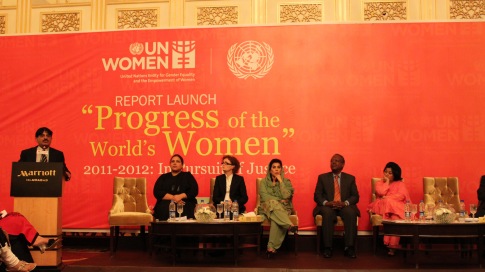Pakistan celebrates launch of Progress Report on Access to Justice
Date:

At 13, she had acid thrown in her face. Now many years later, the young survivor spoke of her experiences in an audio message at the launch of UN Women’s flagship publication for 2011-12, Progress of the World’s Women: Access to Justice in Pakistan. The launch was an opportunity for policy makers, government officials, civil society, lawyers, doctors and police officers to examine access to justice for women in Pakistan and identify solutions to improve the existing situation.
Unveiling the report, Dr. Fehmida Mirza, Speaker of the National Assembly, and the first woman speaker in the Muslim world made a strong case for women in legislation. “It is high time that we make our society realize that gender roles, inequalities and power imbalances are not a ‘natural’ result of biological differences, but determined by the systems and cultures in which we live. The same can be changed if we seek social change,” she said.
Dr Mirza also spoke of her proposal to “create a Parliament for the South Asian Association for Regional Cooperation (SAARC) that could allow parliamentarians to address social injustice, speed up progress on the Millennium Development Goals and create gender balance”.
The Prime Minister of Pakistan, Mr. Yousaf Raza Gilani also extended his support to UN Women. In a recorded video message, he said: “Pakistan is on the Executive Board of UN Women as a sign of its commitment to gender equality and women’s rights in Pakistan and around the world.” He further added that the ratification of the Convention for the Elimination of All forms of Discrimination Against Women (CEDAW) by Pakistan in 1996, and its devolution at the provincial and local levels were signs of this commitment.
Mr. Zia Awan, a prominent lawyer and human rights activist, highlighted the practical challenges in ensuring justice in the presence of ‘parallel legal systems’ in Pakistan. On behalf of law enforcement, Mr. Ehsan Sadiq, the Assistant Inspector General of the Islamabad Police, stressed the need to build the capacity and understanding of the police force on laws that are beneficial to women.
A panel discussion brought together police officers and doctors to find solutions to accelerate access to justice for women. Station House Officer Sadaf Iqbal joined Dr. Arshad, the Chief Medical Officer of a major government hospital, Mr. Jehangir Jadoon, a barrister representing the legal fraternity and Ms. Saima, a clinical psychologist representing one of the most influential NGOs working on women’s issues in the country, to examine key issues in the implementation of important laws.
The most inspirational case in Pakistan is that of the young acid survivor lwho fought for justice by taking her case to the Supreme Court of Pakistan, having the judgment of the lower court reversed, and securing the maximum punishment for the perpetrator. The Supreme Court ruling even created a legal precedence to lobby for a strong Acid Attack bill in Pakistan.